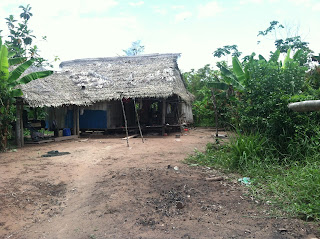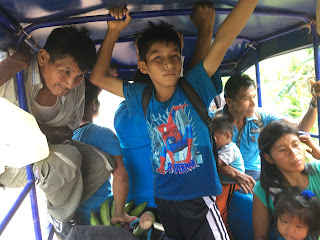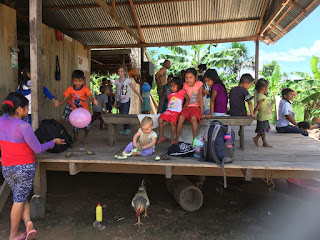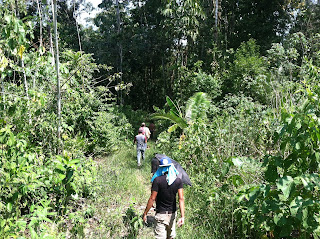We are so blessed! I say it all the time but do I believe
it? Do I realize how blessed we are? Not really. So many times I take things
for granted. The little things such as food, clothes, education, and health. Unfortunately,
I am usually completely oblivious to God’s many blessings unless He shows me
those who are less fortunate. These days our lives are surrounded day in and
day out by those who are less fortunate.
The last two weeks I have spent a lot of time with our Shawi
friends. I have traveled the rivers and spent time in their communities. We
have attended a church anniversary. And this last week we had a Bible training here
in town for 30 Shawi pastors and leaders. I spent the week just talking and
getting to know them. After spending the majority of two weeks with our Shawi
brothers and sisters God has opened my eyes to many things and I am still processing
it all.
Last weekend we were invited to a church anniversary in a
community. The anniversary lasts two days and people travel from the whole district
to attend. I talked with one person who traveled three days in a canoe to
attend. The men dressed in their Sunday best as the woman dressed in their traditional
dress and painted their faces and feet. I had the honor of preaching for the
Saturday morning service and we stayed for a baptism service in the river that afternoon. Ten young men and women were baptized. It was an amazing day of fellowship
and celebration. The men and women of the community had to sacrifice a lot to
prepare food for all the visitors. Having extra food is a blessing.
Then last week during the Bible training I got to know the
Shawi men much better. As I meet people it is important to know where they
live. After I ask I always look at my map of the district for their community.
They were so interested in my map because I am sure most of them had never seen
a map of their area before. Soon I had 20 men gathered around me looking at my
small map. So I went and made 30 copies of the map and returned with one for
each of them. They spent the next hour studying the map and discussing it with
each other. There is no actual map of the Balsapuerto district so my map is
homemade and they helped me by adding some missing villages and correcting
some mistakes. I had a great time learning more about their rivers and
communities. Maps are a blessing.
Some of the Bible teaching was about the nation of Israel
and one of the guys asked me, “Does Israel exist today?” “Well, yes,” I
answered and they asked, “how long does it take to get there?” This gave me an
idea, so I ran home and returned with a globe. It blew their minds! “What is
all the blue stuff?” they asked. When I responded that it was water they said, “wow,
there is a lot more water than land.” I pointed out Peru and Israel and said
that if you could fly direct it would take around 15 hours in a plane(just guessing). It
seemed like very little time to them considering it takes longer than that to get home in a canoe. Roads are a blessing.
Then one of the older guys pointed to Europe and asked, “Is
that the beginning or the end of the world?” I was so confused by the question
I had him repeat it three times and then I realized he thought the world was
flat. I explained that the world was round and that was why the globe was round
and that led to an interesting conversation about how the sun only shines on
half the earth at a time and the cause of day and night and many other things. Education is a
blessing.
When I visit a church it is common that there is only one
Shawi Bible in the whole church and the believers share. I began to research the
Shawi Bible and ask about the need for more Bibles. The men told me
that the biggest problem is that the Shawi Bible is incomplete. The New
Testament is complete but they only have portions of the Old Testament. The men
speak Spanish but the woman do not and this makes it difficult to teach from
the Old Testament. The Spanish Bibles they have are an old version called the
Reina Valera and due to the use of old Spanish words they understand little of
it. I can relate because I don’t understand it either and I have to use a more
modern translation. As a result, it is a huge challenge to read and teach from
the Bible. Complete Bibles in our language is a blessing.
By the end of the week I had spent six days in a row with
some of the men. One of them, a pastor of a community 12 hours up river,
brought his wife and two of their children along on the trip. I took notice
that none of them had changed clothes all week. Then it hit me, the clothes
they were wearing might be the only clothes they own. The ability to buy and
have clothes is a blessing.
This same family is still here in Yurimaguas. The mother got
really sick at the end of the week and went to the emergency room (the doctors are all currently on strike here so ER is the only option unless you can pay for private healthcare). The hospital
said she had a urinary track infection and sent her home with some antibiotics.
She has laid in bed all this week and not eaten anything. Yesterday Jennifer
was talking with her and upon examining her found an abdominal mass. This
morning Jennifer took her back to the hospital and explained everything to the
doctors and it looks like she may have a tumor. I am unsure how someone goes to
the ER with stomach pain and they don’t actually examine her stomach (likely they were brushing people off due to the strike). Healthcare is a blessing.
"I know what it is to be in need, and I know what it is to have plenty. I have learned the secret of being content in any and every situation, whether well fed or hungry, whether living in plenty or in want. I can do all this through him who gives me strength." Philippians 4:12-13
Some videos from the Church Anniversary Services:



























































